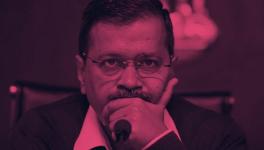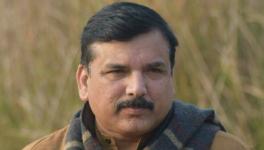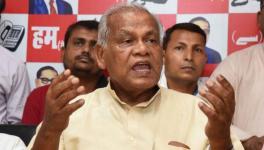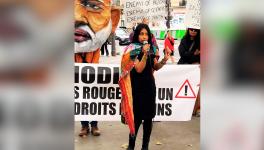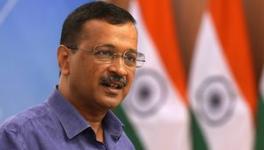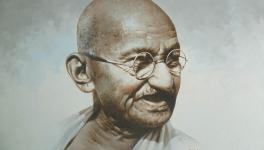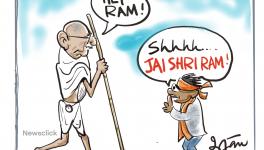Debate with Journalist Ashutosh: Should Muslims Lie Low?
I recently wrote a piece, Asaduddin Owaisi: A Warning Sign, in an attempt to explain his rising electoral graph and that of his party, the All India Majlis-e-Ittehadul Muslimeen. The improvement in the AIMIM’s electoral performance, I suggested, is an outcome of the reluctance of political parties opposed to the Bharatiya Janata Party to speak on issues pertaining to Muslims, let alone intercede on their behalf, even as they are violently targetted, their right to equal citizenship threatened. These parties have vindicated Owaisi’s thesis, an account of which can be read here.
I received a few phone calls as soon as the piece was published. Among the callers was renowned journalist Ashutosh, who quit the profession to join the Aam Aadmi Party, only to leave it later, presumably disappointed. “Muslims, in their own interest, must lie low to defeat Hindutva,” Ashutosh said. Ashutosh is as secular as any Indian can get; his writings and participation in public debates mark him out as a feisty ideological opponent of Hindutva. Believing Ashutosh would not make a flippant remark, I engaged him in a debate, without either of us equivocating on our arguments.
Ashutosh, like Owaisi, has a thesis. He is convinced that the BJP’s popularity is on the decline, palpable from how it has been struggling to win States. It failed, in 2018, to notch victories in Rajasthan and Madhya Pradesh—and was trounced in Chhattisgarh. A few months after sweeping the 2019 national election, the BJP performed well below its expectation in Maharashtra. Haryana produced a hung Assembly. The BJP was walloped in Jharkhand. In Bihar, the National Democratic Alliance, of which the BJP is now a senior partner, huffed and puffed to the victory post. “A 31-year-old man [Tejashwi Yadav] took on the combined might of the BJP, Modi and Janata Dal (United) and nearly defeated them,” Ashutosh told me.
Ashutosh thinks the BJP cannot reverse its downward spiral, largely because it is incapable of delivering on the economic front. It is to distract people from assessing the Modi government’s performance that it chooses to privilege Hindutva over all other issues. It demonises Muslims in order to instigate them into reacting. “In case Muslims react or a segment of them switch from supporting Opposition parties to Owaisi, the BJP will only grow. Take away the BJP’s Hindutva plank, the party will flounder,” Ashutosh said.
“Muslims do understand that,” I replied. As evidence, I pointed out that on my several visits to Delhi’s Shaheen Bagh, where Muslims had organised a 24X7 sit-in against the Citizenship Amendment Act from December onward, I found that the people were not agitated over AAP leader Arvind Kejriwal’s refusal to visit the protestors. They said his presence at Shaheen Bagh would provide the BJP an opportunity to communally polarise the electorate weeks before the Delhi Assembly election, then due in February. And just about every person said the support for him was enormous in Shaheen Bagh.
But Muslims felt terribly betrayed, I said to Ashutosh, when a communal conflagration swept through north-east Delhi. They decidedly suffered far more than Hindus, manifest in the wanton destruction of mosques. Yet Kejriwal’s rhetoric sought to establish parity between the suffering of Muslims and that of Hindus. Victims, at least, expect their wounds to be recognised. Although the Delhi Assembly passed a resolution against the implementation of the National Population Register, the AAP has taken to playing the soft Hindutva card.
“Should I tell you the bitter truth? Had the AAP not played the Hanuman card during the election, had it countered the BJP’s rhetoric on the anti-CAA protests, Kejriwal would have ended up with 40 or 45 seats,” Ashutosh said. (AAP won 63 out of 70 seats in the Delhi Assembly.) His reference to the Hanuman card was AAP’s concerted efforts to appropriate Lord Hanuman for the election campaign, to foil the BJP from exploiting the popular fervour for Lord Ram to harvest votes.
Yes, I conceded. I said I am aware that AAP’s internal surveys, done almost continuously through the election campaign, would show the BJP gaining votes every passing day. It ultimately polled nearly 39% of the votes cast in Delhi, 6.2% higher than in the 2015 election, and increased its seats from three to eight.
“Sadly, today’s reality is that anyone who speaks for Muslims tends to lose votes,” Ashutosh said. “Playing the Hindu card pays.” He said Rahul Gandhi’s temple spree before the 2017 Gujarat Assembly election saw the Congress improve its seat tally from 61 in 2012 to 77 in 2017—and brought down the BJP from 115 to 110. In Madhya Pradesh, the Congress’s manifesto had undeniable Hindutva overtones. “The Congress won Madhya Pradesh, Rajasthan and Chhattisgarh,” Ashutosh pointed out. (All three states went to the polls at the same time that year.)
“But for Chhattisgarh, the Congress did not win a comfortable majority in Rajasthan and Madhya Pradesh, where it lost its government,” I countered. It is, therefore, hard to tell whether the Congress won narrowly because of its Hindu card. It is quite possible that the people ignored anti-incumbency against the BJP government and chose a more “authentic” or aggressive Hindu party than its carbon copy. Might this not have enabled the BJP to bridge the gap between itself and the Congress?
Hindutva is becoming India’s common sense, I continued. The Opposition may wish to remain silent on Hindutva issues, evident from its strategy in Delhi and Bihar, but the BJP will always bring these to the fore, in the hope of ensuring that voters cast their ballot as Hindus, not as citizens or as members of distinctive class, caste and linguistic groups. “The threshold of acceptance of Hindutva has plummeted so low that the BJP has to only remind the electorate about its Hindutva agenda to bag votes. Perhaps this explains the BJP-JD(U) coming from behind to snatch a narrow victory in Bihar,” I suggested. There is also the possibility of the Hindu Right raising its pitch on Hindutva. Can the Opposition imitate the Right—for instance, lynch in the name of the cow? Or foment violence to gather votes?
True, it cannot, agreed Ashutosh. “But it is also true that the Opposition has to demonstrate to the people that it is not anti-Hindu. The choice before Muslims is whether they want to live with Hindu liberals or with Hindu communalists in power,” Ashutosh said with his customary passion. “To live with Hindu liberals, the Muslim community will have to accept its own political invisibility for a short while,” he added. Once the BJP is ousted from power, it is hoped a new Hindu liberal arrangement will be put in place. “If the current situation persists, you will have genocide after 10 years,” Ashutosh predicted.
In full flow now, Ashutosh said his problem with Owaisi is that he conceals from Muslims the nature of threat facing them. “In the first-past-the-post poll system, when anti-BJP votes are divided, it only means strengthening Hindutva. Owaisi consciously divides Muslim votes,” Ashutosh said. He took exception to the claim that Owaisi speaks the “language of constitutionalism,” which I cited as a factor for his rising popularity among Muslims.
“Language of constitutionalism, my foot,” Ashutosh retorted. “He is merely engaging in the politics of identity, cynically glossing over its consequences.”
“Every leader thrives on the politics of identity in India. So why blame him,” I quipped, adding, “There is, anyway, just a small segment of Muslims who vote for the AIMIM, although the party’s polling percentage cannot be a measure of Owaisi’s popularity.”
“That is my point,” Ashutosh riposted. “Every victory will increase his popularity even further—and fracture anti-BJP votes. The Muslim intelligentsia must warn the community against falling into Owaisi’s trap, which helps the BJP and imperils their existence. You should write that.”
I took a leaf out of a piece that academician Ali Khan Mahmudabad, who is also a member of the Samajwadi Party, had written in August. In that piece, Khan cited a Centre for Development and Practice survey on the voting pattern of under-35 youth in four states, Gujarat, Uttar Pradesh, Madhya Pradesh and Rajasthan. Conducted around three months before the 2019 national election, the survey showed that the world-view of both non-BJP and BJP voters more or less matched. For instance, 84.7% of those who intended to vote for the BJP in the national election said they supported the introduction of the Uniform Civil Code, as did 74.29% of those who did not plan to vote for the BJP. On the morning my piece on Owaisi was published, Ali Khan sent the link to his piece to me, with a message, “The problem is not just political, but also social.”
Reminded of Khan’s message, I said to Ashutosh that the battle against Hindutva has to be delinked from electoral politics, that the hearts and minds of Hindus cannot be won by holding election rallies a few weeks before the polling day, and that Opposition leaders have to hold dialogue with the people from district to district, village to village, round the year, to explain to them why Hindutva is not Hinduism. “From Rahul Gandhi to Arvind Kejriwal, do you think they have the courage to tell Hindus on what it means to be a good Hindu? Do you think they can interpret the ancient texts to show why the BJP’s brand of Hinduism is shallow or flawed? Until this is done, the Opposition can never win the battle against Hindutva.”
Ashutosh, a little thoughtfully, said, “Yes, I agree.” He sighed and said, “The problem is that there is no leader with a vision in India.” Indeed, a vision such as the BJP’s cannot be tackled merely through electoral politics, regardless of a win here and a win there for the Opposition. Hindutva can only be defeated through an alternative vision of Hinduism. Only then the BJP can be vanquished.
The author is an independent journalist. The views are personal.
Get the latest reports & analysis with people's perspective on Protests, movements & deep analytical videos, discussions of the current affairs in your Telegram app. Subscribe to NewsClick's Telegram channel & get Real-Time updates on stories, as they get published on our website.









